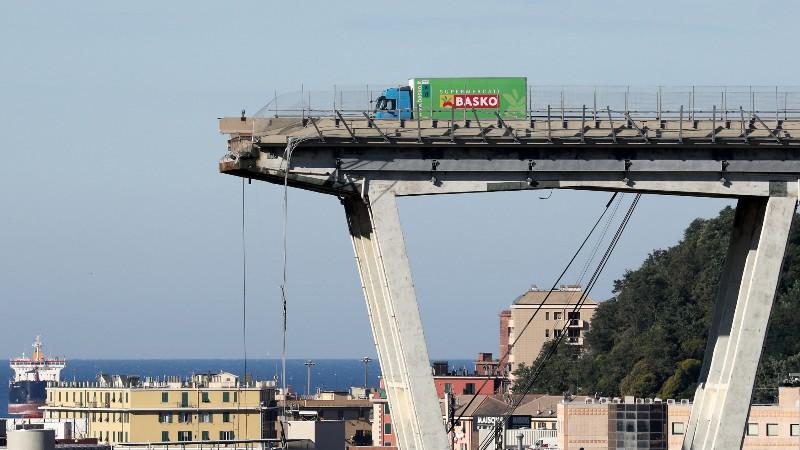Officials point blame at bridge operator in deadly Genoa collapse
The collapsed Morandi Bridge is seen in the Italian port city of Genoa, Italy.
Rescuers hunted for survivors among huge chunks of debris on Wednesday after a bridge collapse that killed 39, as furious government ministers rounded on the viaduct’s operator, saying it should pay fines and compensation and lose its concession.
The 50-year-old bridge, part of a toll motorway linking the port city of Genoa with southern France, collapsed during torrential rain on Tuesday, sending dozens of vehicles crashing onto a riverbed, a railway and two warehouses.
Eye-witness Ivan, 37, evacuated on Tuesday from the nearby building where he works, described the collapse as unbelievable.
“To see a pylon come down like papier-mâché is an incredible thing,” he said. “It’s been a lifetime that we’ve known there were problems. It is in continual maintenance.”
“In the ’90s they added some reinforcements on one part, but also underneath you can see rust.”
As cranes moved in to shift truck-sized chunks of broken concrete, hundreds of firefighters searched for survivors, while public shock and grief turned to anger over the state of the 1.2 km-long bridge, completed in 1967 and overhauled two years ago.
Italian Transport Minister Danilo Toninelli, visiting the disaster scene, said bridge operator Autostrade would have to contribute to the cost of its reconstruction as well as pay heavy fines.
But Autostrade, a unit of Milan-listed Atlantia group, said it had done regular, sophisticated checks on the structure before the disaster, relying on “companies and institutions which are world leaders in testing and inspections” and that these had provided reassuring results.
“These outcomes have formed the basis for maintenance work approved by the Transport Ministry in accordance with the law and the terms of the concession agreement,” it said.
Weight of traffic
However the bridge’s condition, and its ability to sustain large increases in both the intensity and weight of traffic over the years, have been a focus of public debate since Tuesday’s collapse, when an 80-meter span gave way at lunchtime as cars packed with holidaymakers as well as trucks streamed across it.
Deputy Prime Minister and Interior Minister Matteo Salvini said the private sector manager of the bridge had earned “billions” from tolls but “did not spend the money they were supposed to” and its concession should be revoked.
He was apparently referring to Autostrade.
“Imposing the highest penalties possible and making sure that those responsible for the dead and the injured pay up for any damages and crimes is the very least,” he said.
Toninelli earlier said he had begun a process to strip Autostrade of its concession and he demanded top Autostrade managers resign.
“Autostrade per l’Italia was not able to fulfill its obligations under the contract regulating management of this infrastructure,” Danilo Toninelli said on RAI 1 state TV, adding that he would also seek to levy heavy fines against the company.
“I have given mandate to my ministry to start all proceedings to apply the agreement, that is to revoke the concession from these companies and seek significant sanctions which can reach up to 150 million euros based on the terms of the contract.”
The Morandi Bridge, named after the engineer who designed it, forms part of the A10 motorway run by Autostrade. The 55-km (34 mile) stretch of the A10 accounts for around 1.7 percent of total network traffic for Italy’s biggest toll road operator, according to one analyst’s estimate.
Autostrade’s parent, Atlantia, also runs toll-road concessions in Brazil, Chile, India and Poland.
The World is an independent newsroom. We’re not funded by billionaires; instead, we rely on readers and listeners like you. As a listener, you’re a crucial part of our team and our global community. Your support is vital to running our nonprofit newsroom, and we can’t do this work without you. Will you support The World with a gift today? Donations made between now and Dec. 31 will be matched 1:1. Thanks for investing in our work!
